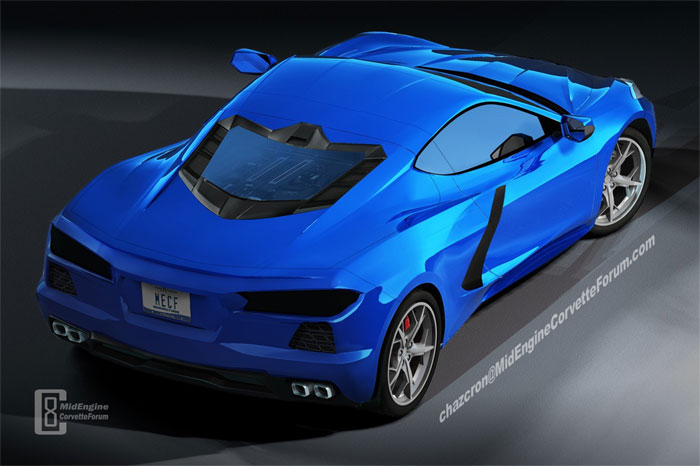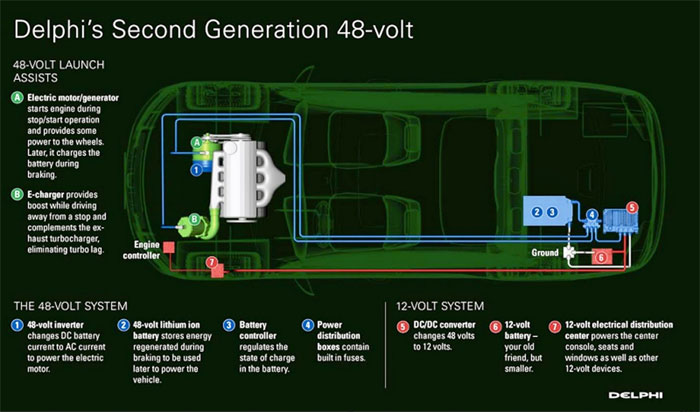Last week we all became aware of the reports that the C8 Corvette is being delayed over electrical problems and while we didn’t want to believe it at first, it does appear that something is amiss with the new Corvette’s electrical system.
I’m no electrical engineer and we have no information on the type of the electrical system in the new Mid-Engine Corvette, but lucky for us we have friends on the MidEngineCorvetteForum.com who have been digging into this issue and have come up with some fascinating information about modern-day automotive electrical systems.
Since the 1950s most vehicles have operated with a 12V electrical system and battery which provided plenty of starting power for most vehicles. Today’s vehicles are more power-hungry and “more juice” is needed to start and run the new electronic systems as manufacturers have replaced previous mechanical-driven components with more efficient electrical-powered components including power steering racks, electric brake vacuum pumps and electric water pumps to name a few. Then you have all the new infotainment options as well as creature comforts like heated or cooled seats, lane departure warnings, and even adaptive cruise control systems that need to be powered as well, and you can see how a 12-volt system could be in danger of being maxed out.
The alternative to the 12V system that most automakers are going with are 48V systems which provide more than enough electrical power through the system. Not only does a 48V system have the juice to handle the new electronics, but they can also offer the ability for more performance and fuel economy savings. In fact, 48V systems are described as “mild hybrids” because the alternator is replaced with an electric generator to provide the additional electrical power. As more of the mechanical components can be converted to electric systems, that means less parasitic power loss to engines which improves fuel economy, reduces emissions and increases power.
One article we read touts Audi as using a 48V system in conjunction with an electrically powered supercharger which boosts power at low engine speeds without the lag of an exhaust-driven turbo is known for, while a lithium-ion battery in the trunk recaptures energy from regenerative braking. When the ZR1 first came out, we learned the massive supercharger draws about 100 horsepower from the engine. Think about the power that could be gained if more mechanical systems could be off-loaded to an electrical power system.
Delphi is one of the leading providers of 48V systems and here is a great graphic that shows more about a 48-volt electrical system.
Another aspect of what Corvette engineers are dealing with may have to do with the higher performance models. The rumors of the C8 Corvette have been pretty strong that a hybrid “E-Ray Corvette” that makes upwards of 1,000 hp through a combination of an internal combustion engine and electric motors on the wheels. We’ve also seen some recent patents like this control system for active aerodynamics that are rumored for the C8 as well. Obviously, a system like that would need a much more robust electrical system to handle those electrical loads.
So going back to the Corvette’s electrical woes, we can imagine several scenarios where either they went with the 12V system similar to the C7s for cost savings and they are finding it’s just not enough power, or they went with the 48V system and are having some growing pains in getting all the systems to work correctly. A third option might be a hybrid 12V/48V system that divides the system for lights and vehicle starting vs everything else. As Corvette is the “technological tip of the spear” for GM, it seems unlikely that engineers would go with any system that isn’t state of the art.
I guess what really gets my goat in the electrical delay story are the comments that say Chevy engineers are morons who don’t know what they are doing when in fact what they are doing is probably so much more.
When the story of the delay got out there, Paul Koerner, a GM World-Class Technician at Jackson Chevrolet in Connecticut left us this comment and we are wrapping up this article with his words:
Regardless of what people think they know or do not, the following holds true. Global B electronics architecture is a very amazing system and it has had growing pains in other motor vehicle manufacturer lines and this is why preproduction testing is so critical and why we have seen vehicles in Colorado, Florida and overseas. Multiple conditions and usages, my advise is: Be patient and short cuts are not part of Corvette engineering.
Great advice Paul!
Source:
MidEngineCorvetteForum.com
Related:
Has the C8 Mid-Engine Corvette Been Delayed Six Months for Electrical Problems?
Chevrolet Will Not Launch the 2020 Mid-Engine Corvette at NAIAS
Did an Insider Just Reveal GM’s Bold Plan for the C8 Corvette Manta Ray?
-



![[VIDEO] 2024 Corvette E-Ray Roll Races a Lamborghini, Ferrari 488 Pista [VIDEO] 2024 Corvette E-Ray Roll Races a Lamborghini, Ferrari 488 Pista](https://www.corvetteblogger.com/images/content/uploads/2024/04/042424_24-218x150.jpg)
![[PICS] Three New Colors Introduced for the 2025 Corvette [PICS] Three New Colors Introduced for the 2025 Corvette](https://www.corvetteblogger.com/images/content/uploads/2024/04/042424_23-218x150.jpg)
![[PICS] The 2025 Corvette Stingray is Getting a New Standard Z51 Spoiler [PICS] The 2025 Corvette Stingray is Getting a New Standard Z51 Spoiler](https://www.corvetteblogger.com/images/content/uploads/2024/04/042424_12-218x150.jpg)
The problem with the electrical system may be something as simple as what they had with the GMT900 Tahoes. In the never-ending search for more fuel economy they decided to cut the alternator charging current to the battery when it was deemed not needed. The problem with this was that in a lot of short in town trips, the battery never got fully charged. It was not uncommon for the battery to be drained to the point of running the radio for 15 minutes and you would not be able to start the vehicle.
Marc
BMW does the same thing for years plus a stop start system also to save fuel. They use the engine during breaking to initiate and start charging for assisting braking, smart!
But if the drivers and it occupants or excessive stop and go is using the battery power too much the system make the alternator active continuously until the battery is holding the correct charge( storage level).
Also electric loads have gone up on some systems but LED lighting inside and exterior has gone down to a fraction of the older systems.
The article is a joke on condemning the ZR1. Can anyone imagine a 100 hp motor for the compressed air needs ????
For a short burst you may have a feasible system but for a fully Track Ready ZR1 no way running full out for 10 to 20 minutes.
Chevy engineers are too smart to make that crazy move.
I’m personally suspicious of the screwed up electrical system but more concern the issue lies deeper in the engine and the Track Ready stuff again like the Z06 which I had the pleasure of owning but it’s gone now. A true beast 95% of the time.
The new Vette should not have thrown a curve ball st the Corvette engineers on an electrical basis. If so… Shame!
Another reason to wait for a few years of production models before jumping in to only live with a headache.
Lessons Learned from jumping in too soon since the sixes?.
A similar 12v problem occurs in the FCA Jeep “stop/start” system.Although annoying to many drivers, the system was designed to cut emissions. The problem is that after 6-12 months of use, the vehicle’s battery loses some amperage and the dashboard signal “ stop/start inactive-battery charging” comes on constantly for all purposes permanently inactivating the system. Simarlarly in the C7, the battery needs to be kept on life support on a tender for non-use beyond 2 weeks or the owner will face an undercharged no-start situation.
Just another sign of the need for 48v systems in modern vehicles.
An electric supercharger and electric front-wheel-drive/all-wheel-drive on-demand? SHWEET!!!
Take your time Chevrolet!
Comments are closed.